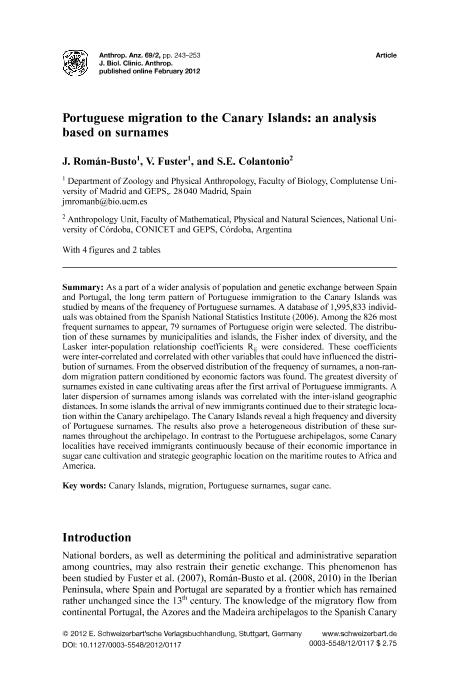Mostrar el registro sencillo del ítem
dc.contributor.author
Román Busto, Jorge
dc.contributor.author
Fuster, Valeria de Los Angeles

dc.contributor.author
Colantonio, Sonia Edith

dc.date.available
2021-07-07T13:57:29Z
dc.date.issued
2012-03
dc.identifier.citation
Román Busto, Jorge; Fuster, Valeria de Los Angeles; Colantonio, Sonia Edith; Portuguese migration to the Canary Islands: An analysis based on surnames; E Schweizerbartsche Verlags; Anthropologischer Anzeiger; 69; 2; 3-2012; 243-253
dc.identifier.issn
0003-5548
dc.identifier.uri
http://hdl.handle.net/11336/135636
dc.description.abstract
As a part of a wider analysis of population and genetic exchange between Spain and Portugal, the long term pattern of Portuguese immigration to the Canary Islands was studied by means of the frequency of Portuguese surnames. A database of 1,995,833 individuals was obtained from the Spanish National Statistics Institute (2006). Among the 826 most frequent surnames to appear, 79 surnames of Portuguese origin were selected. The distribution of these surnames by municipalities and islands, the Fisher index of diversity, and the Lasker inter-population relationship coefficients Rij were considered. These coefficients were inter-correlated and correlated with other variables that could have influenced the distribution of surnames. From the observed distribution of the frequency of surnames, a non-random migration pattern conditioned by economic factors was found. The greatest diversity of surnames existed in cane cultivating areas after the first arrival of Portuguese immigrants. A later dispersion of surnames among islands was correlated with the inter-island geographic distances. In some islands the arrival of new immigrants continued due to their strategic location within the Canary archipelago. The Canary Islands reveal a high frequency and diversity of Portuguese surnames. The results also prove a heterogeneous distribution of these surnames throughout the archipelago. In contrast to the Portuguese archipelagos, some Canary localities have received immigrants continuously because of their economic importance in sugar cane cultivation and strategic geographic location on the maritime routes to Africa and America.
dc.format
application/pdf
dc.language.iso
eng
dc.publisher
E Schweizerbartsche Verlags

dc.rights
info:eu-repo/semantics/openAccess
dc.rights.uri
https://creativecommons.org/licenses/by-nc-sa/2.5/ar/
dc.subject
CANARY ISLANDS
dc.subject
MIGRATION
dc.subject
PORTUGUESE SURNAMES
dc.subject
SUGAR CANE
dc.subject.classification
Ciencias Sociales Interdisciplinarias

dc.subject.classification
Otras Ciencias Sociales

dc.subject.classification
CIENCIAS SOCIALES

dc.title
Portuguese migration to the Canary Islands: An analysis based on surnames
dc.type
info:eu-repo/semantics/article
dc.type
info:ar-repo/semantics/artículo
dc.type
info:eu-repo/semantics/publishedVersion
dc.date.updated
2021-06-30T14:30:35Z
dc.identifier.eissn
2363-7099
dc.journal.volume
69
dc.journal.number
2
dc.journal.pagination
243-253
dc.journal.pais
Alemania

dc.journal.ciudad
Stuttgart
dc.description.fil
Fil: Román Busto, Jorge. Universidad Complutense de Madrid; España
dc.description.fil
Fil: Fuster, Valeria de Los Angeles. Universidad Complutense de Madrid; España
dc.description.fil
Fil: Colantonio, Sonia Edith. Consejo Nacional de Investigaciones Científicas y Técnicas. Centro Científico Tecnológico Conicet - Córdoba. Centro de Investigaciones y Estudios sobre Cultura y Sociedad. Universidad Nacional de Córdoba. Centro de Investigaciones y Estudios sobre Cultura y Sociedad; Argentina
dc.journal.title
Anthropologischer Anzeiger
dc.relation.alternativeid
info:eu-repo/semantics/altIdentifier/url/https://www.schweizerbart.de/papers/anthranz/detail/69/76919/Portuguese_migration_to_the_Canary_Islands_an_analysis_based_on_surnames?af=search
dc.relation.alternativeid
info:eu-repo/semantics/altIdentifier/doi/http://dx.doi.org/10.1127/0003-5548/2012/0117
Archivos asociados
